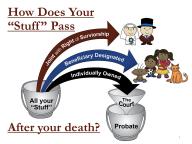|
Tuesday, October 4, 2022
 I just got back from a trip to the beach where there were back-to-back weddings near the ocean. So many new brides and grooms! Are you planning to get married or divorced in the near future? How will that affect your estate plan?
An estate plan has lots of pieces and moving parts, but let’s start with how marriage and divorce affect the basic legal documents you should have in your estate plan.
WHAT HAPPENS TO MY OLD WILL?
If you marry after signing a will and you have not specifically stated in the document that you are executing the will in anticipation of a future marriage, that will signed previous to marriage will not be valid. If you then die without executing a new will, you will die intestate and the rules of the state of Georgia will control distribution of your assets. That means that if you have a wife and children, your new spouse will share the assets in your probate estate with your children. Read more . . .
Wednesday, September 14, 2022
 Mary, an independent, strong-willed woman all of her life, realized that she might need help managing her finances. She came to me with concerns that her memory might be slipping a little, and she was afraid that she might forget to pay her bills. After assuring her that she was fine, I encouraged her to consider placing her assets in a trust so that she could write her own rules for management of those assets. Mary was skeptical. “Trusts are way too complicated for me! I don’t even know what a trust is. Read more . . .
Wednesday, June 22, 2022
7243.jpg) ABLE (Achieving a Better Life Experience) accounts offer people with disabilities a great, tax-free way to accumulate money without jeopardizing their qualifications for Supplemental Security Income (SSI) and other means-tested programs. Withdrawals are tax-free as long as the money is used for “qualified disability expenses.” The arguments for starting and maintaining such funds are overwhelming, not least of which is the wide variety of things on which the money can be spent. To build 529A ABLE accounts, beneficiaries (and other contributors) can put up to $16,000 total into these funds each year. Read more . . .
Monday, June 6, 2022
Writing Instructions to Potential Guardians If you have minor children, or children with disabilities, the thought of leaving them suddenly is unimaginable. Parents know their children- their schedules, their health, their likes and dislikes- but keep most of that knowledge in their heads. When my kids were growing up, I knew when they needed to be at soccer practice and church, who their doctor was and how to reach her, and how to tell when they were sick. Other than abbreviations on my calendar and names in my database, there was no formal written schedule of activities or list of important contacts. Most parents can’t imagine how someone would be able to step in and take care of their children. Read more . . .
Wednesday, February 10, 2021
 What should you do when a loved one dies? How and when does the estate get administered? Administration is defined as Court-supervised distribution of an estate during probate. Also used to describe distribution process for a trust. Probate means proving the will, but it can also be used to indicate a court process to handle a deceased person’s estate. When a loved one dies, there is often confusion and panic about what legal and financial steps should be taken by survivors. There may be little information about the finances of the decedent, and spouses or children are left to sort through what may seem like a never-ending mass of papers. Read more . . .
Monday, December 28, 2020
 An heir is the person or persons who are related by blood that would inherit from a decedent ( a person who has died) if the decedent had no will. An heir is the person or persons who are related by blood that would inherit from a decedent ( a person who has died) if the decedent had no will.
A beneficiary is a person (or charity or institution) named in a will to whom the decedent wishes to leave his or her assets at the time of death.
Who are your heirs? Take your wrist and place two fingers on your other hand and place them on your wrist. Do you feel a pulse? If so, you don’t yet have any heirs. That is kind of a snarky way to explain that we cannot know who your heirs are until you are dead.Read more . . .
Friday, February 7, 2020
 My favorite hobby is reading and I try to combine my love of reading with my profession of estate planning. The plots of some of my favorite books are about dysfunctional family relationships complicated by really bad estate planning!Here are three books I recommend where siblings were torn apart by their parents’ bad estate planning choices.The Nestby Cynthia D’Aprix SweeneyThe four siblings of the Plumb family - Leo, Melody, Beatrice, and Jack- are the beneficiaries of a trust fund they call “The Nest” left to them by their father. The terms of the trust provide that the trust assets will be distributed equally to the four siblings when the youngest, Melody, reaches age 40. When the book begins, Melody is fast-approaching her 40th birthday, and each of the siblings is anxiously awaiting the distribution that could solve their self-inflicted life problems.
Read more . . .
Thursday, June 22, 2017
 Jennifer’s 80-year-old mother seemed to be running low on funds every month. By the end of the month, she had no money for groceries. Jennifer had helped her mother with a budget, so she thought her mother had plenty of money to make it through each month. When she asked her mother to allow her to look at her bank statements, though, Jennifer discovered a series of automatic debits to several companies she did not recognize. It turns out, her mother had signed up for monthly book delivery clubs, as well as recurring magazine subscriptions for magazines Jennifer knew her mother did not read. Read more . . .
Thursday, July 16, 2015
 July is Sandwich Generation Awareness Month. The Sandwich Generation refers to those people, mostly in their mid-40’s to late 50’s, who are caring for aging parents as well as caring for young children or dependent young adult children. If you are the meat or peanut butter in that sandwich, you might be looking for help from your siblings or other family members. One of the best ways to plan the care for an aging or disabled family member is by holding a family meeting. The meeting is designed to do many things: get information from the aging or disabled person about their needs, figure out what kind of care is needed and brainstorm about ways to find that care, gauge the financial resources available for care, and assign duties to various family members so that one caregiver does not get burned out. Read more . . .
Monday, April 22, 2013
 Unfortunately, there have been an increase in reports of senior citizens being taken advantage of. There are various ways seniors are being taken advantage of, but one strikes particular interest with our firm; the deceptive and unfair methods of some Financial Advisors.
Being an Elder Care and Disability Law Firm, we are constantly in contact and working closely with Financial Advisors. They are a vital resource not only for us, but for our clients. We are confident in the Financial Advisors that we work with, but it is a shame that not many out there are honoring their commitment and efforts to help families. Read more . . .
Monday, February 11, 2013
Last fall the Social Security Administration quietly released the text of changes to the Program Operations Manual System -- the POMS. Though described as "clarifications" by Social Security, they were actually far-reaching changes that would have driven up the cost of trust administration, complicated the lives of beneficiaries and provided no additional protection for anyone involved.
Lawyers, trustees and advocates raised objections, and thankfully Social Security listened. Last week another set of changes were announced and the news is entirely good for everyone.
First, a word about POMS. Read more . . .
The Elrod-Hill Law Firm,LLC assists clients with Estate Planning, Veterans Benefits, Medicaid, Elder Care Law, Probate, Special Needs Planning and Pet Trusts in the North Atlanta area including the counties of Dekalb, Gwinnett and Fulton.
|

|
|
|